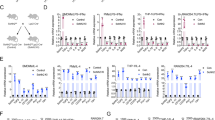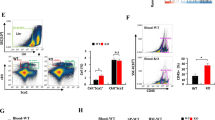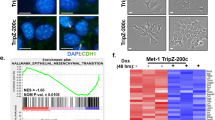Abstract
Recent studies underscore the importance of crosstalk between tumor-associated macrophages (TAMs) and tumor cells in cancer progression and metastasis. In our study, AdCD68STAT3β, a recombinant adenovirus containing a STAT3β gene driven by CD68 macrophage-specific promoter, was used to suppress STAT3 and the downstream signaling pathways in TAMs. The results showed that STAT3β gene under the control of CD68 macrophage-specific promoter was only expressed in macrophages, which significantly inhibited the motility and invasion of breast cancer cells when co-cultured with 4T1 cells. Moreover, cell-specific STAT3β expression in TAMs extended survival of tumor-bearing mice and suppressed breast tumor growth, angiogenesis and metastasis, by regulating the crosstalk between tumor cells and TAMs. Therefore, our study provided a novel strategy for the antitumor effects of STAT3β.
This is a preview of subscription content, access via your institution
Access options
Subscribe to this journal
Receive 12 print issues and online access
$259.00 per year
only $21.58 per issue
Buy this article
- Purchase on Springer Link
- Instant access to full article PDF
Prices may be subject to local taxes which are calculated during checkout




Similar content being viewed by others
References
Quail DF, Joyce JA . Microenvironmental regulation of tumor progression and metastasis. Nat Med 2013; 19: 1423–1437.
Zhang Y, Yang P, Wang XF . Microenvironmental regulation of cancer metastasis by miRNAs. Trends Cell Biol 2014; 24: 153–160.
Sounni NE, Noel A . Targeting the tumor microenvironment for cancer therapy. Clin Chem 2013; 59: 85–93.
Wynn TA, Chawla A, Pollard JW . Macrophage biology in development, homeostasis and disease. Nature 2013; 496: 445–455.
De Palma M, Lewis CE . Macrophage regulation of tumor responses to anticancer therapies. Cancer Cell 2013; 23: 277–286.
Chanmee T, Ontong P, Konno K, Itano N . Tumor-associated macrophages as major players in the tumor microenvironment. Cancers 2014; 6: 1670–1690.
He KF, Zhang L, Huang CF, Ma SR, Wang YF, Wang WM et al. CD163+ tumor-associated macrophages correlated with poor prognosis and cancer stem cells in oral squamous cell carcinoma. Biomed Res Int 2014; 2014: 838632.
Ye XZ, Xu SL, Xin YH, Yu SC, Ping YF, Chen L et al. Tumor-associated microglia/macrophages enhance the invasion of glioma stem-like cells via TGF-beta1 signaling pathway. J Immunol 2012; 189: 444–453.
Su S, Liu Q, Chen J, Chen F, He C, Huang D et al. A positive feedback loop between mesenchymal-like cancer cells and macrophages is essential to breast cancer metastasis. Cancer Cell 2014; 25: 605–620.
Chen J, Yao Y, Gong C, Yu F, Su S, Liu B et al. CCL18 from tumor-associated macrophages promotes breast cancer metastasis via PITPNM3. Cancer Cell 2011; 19: 541–555.
Fofaria NM, Srivastava SK . Critical role of STAT3 in melanoma metastasis through anoikis resistance. Oncotarget 2014; 5: 7051–7064.
Yu H, Pardoll D, Jove R . STATs in cancer inflammation and immunity: a leading role for STAT3. Nat Rev Cancer 2009; 9: 798–809.
Yu H, Kortylewski M, Pardoll D . Crosstalk between cancer and immune cells: role of STAT3 in the tumour microenvironment. Nat Rev Immunol 2007; 7: 41–51.
Zhang X, Tian W, Cai X, Wang X, Dang W, Tang H et al. Hydrazinocurcumin encapsuled nanoparticles "re-educate" tumor-associated macrophages and exhibit anti-tumor effects on breast cancer following STAT3 suppression. PLoS One 2013; 8: e65896.
Fujiwara Y, Takeya M, Komohara Y . A novel strategy for inducing the antitumor effects of triterpenoid compounds: blocking the protumoral functions of tumor-associated macrophages via STAT3 inhibition. Biomed Res Int 2014; 2014: 348539.
Niu G, Shain KH, Huang M, Ravi R, Bedi A, Dalton WS et al. Overexpression of a dominant-negative signal transducer and activator of transcription 3 variant in tumor cells leads to production of soluble factors that induce apoptosis and cell cycle arrest. Cancer Res 2001; 61: 3276–3280.
Xu G, Zhang C, Zhang J . Dominant negative STAT3 suppresses the growth and invasion capability of human lung cancer cells. Mol Med Rep 2009; 2: 819–824.
Zammarchi F, de Stanchina E, Bournazou E, Supakorndej T, Martires K, Riedel E et al. Antitumorigenic potential of STAT3 alternative splicing modulation. Proc Natl Acad Sci USA 2011; 108: 17779–17784.
Caldenhoven E, van Dijk TB, Solari R, Armstrong J, Raaijmakers JA, Lammers JW et al. STAT3beta, a splice variant of transcription factor STAT3, is a dominant negative regulator of transcription. J Biol Chem 1996; 271: 13221–13227.
Kang WS, Kwon JS, Kim HB, Jeong HY, Kang HJ, Jeong MH et al. A macrophage-specific synthetic promoter for therapeutic application of adiponectin. Gene Therapy 2014; 21: 353–362.
Levin MC, Lidberg U, Jirholt P, Adiels M, Wramstedt A, Gustafsson K et al. Evaluation of macrophage-specific promoters using lentiviral delivery in mice. Gene Therapy 2012; 19: 1041–1047.
Wen YA, Yu XL, Xia QF, Cen D, Liu JB, Tu ZG . Macrophage-specific overexpression of antimicrobial peptide PR-39 inhibits intracellular growth of Salmonella enterica serovar Typhimurium in macrophage cells. Int J Antimicrob Agents 2009; 34: 315–321.
Luo J, Deng ZL, Luo X, Tang N, Song WX, Chen J et al. A protocol for rapid generation of recombinant adenoviruses using the AdEasy system. Nat Protoc 2007; 2: 1236–1247.
Luo Y, Zhou H, Krueger J, Kaplan C, Lee SH, Dolman C et al. Targeting tumor-associated macrophages as a novel strategy against breast cancer. J Clin Invest 2006; 116: 2132–2141.
Herrmann A, Kortylewski M, Kujawski M, Zhang C, Reckamp K, Armstrong B et al. Targeting Stat3 in the myeloid compartment drastically improves the in vivo antitumor functions of adoptively transferred T cells. Cancer Res 2010; 70: 7455–7464.
Deng J, Liu Y, Lee H, Herrmann A, Zhang W, Zhang C et al. S1PR1-STAT3 signaling is crucial for myeloid cell colonization at future metastatic sites. Cancer Cell 2012; 21: 642–654.
Burke WM, Jin X, Lin HJ, Huang M, Liu R, Reynolds RK et al. Inhibition of constitutively active Stat3 suppresses growth of human ovarian and breast cancer cells. Oncogene 2001; 20: 7925–7934.
Gough PJ, Gordon S, Greaves DR . The use of human CD68 transcriptional regulatory sequences to direct high-level expression of class A scavenger receptor in macrophages in vitro and in vivo. Immunology 2001; 103: 351–361.
He W, Qiang M, Ma W, Valente AJ, Quinones MP, Wang W et al. Development of a synthetic promoter for macrophage gene therapy. Hum Gene Ther 2006; 17: 949–959.
Acknowledgements
We thank Dr Yang'an Wen (First Affiliated Hospital, Chongqing Medical University, Chongqing, China) for technical supporting; Dr Tong-Chuan He (University of Chicago Medical Center, Chicago, IL, USA) for providing adenovirus AdEasy system; and Dr Ping Li and Dr Yao Hai for assisting with animal experiments. This work was supported by the National Natural Science Foundation of China (No. 81272544).
Author information
Authors and Affiliations
Corresponding author
Ethics declarations
Competing interests
The authors declare no conflict of interest.
Rights and permissions
About this article
Cite this article
Dang, W., Tang, H., Cao, H. et al. Strategy of STAT3β cell-specific expression in macrophages exhibits antitumor effects on mouse breast cancer. Gene Ther 22, 977–983 (2015). https://doi.org/10.1038/gt.2015.70
Received:
Revised:
Accepted:
Published:
Issue Date:
DOI: https://doi.org/10.1038/gt.2015.70
This article is cited by
-
STAT3 is over-activated within CD163pos bone marrow macrophages in both Multiple Myeloma and the benign pre-condition MGUS
Cancer Immunology, Immunotherapy (2022)
-
STAT3 inhibition specifically in human monocytes and macrophages by CD163-targeted corosolic acid-containing liposomes
Cancer Immunology, Immunotherapy (2019)



